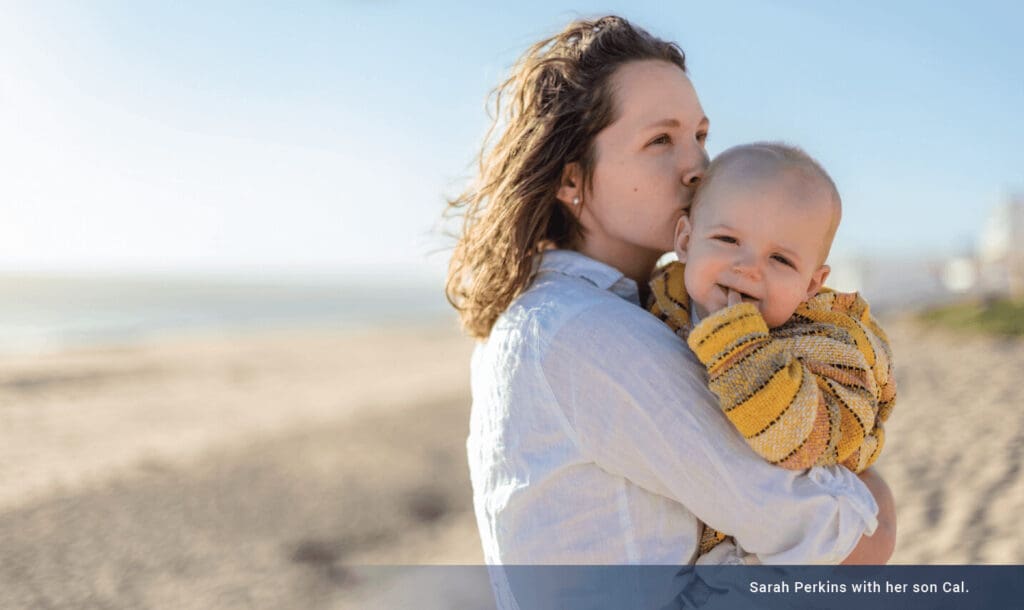AT 2:07 A.M. on Saturday, July 16, 2022, Sarah Perkins texted the family group chat: CPS just took custody.
Her sister-in-law Dia wrote back: No no no no.
Custody of both kids? Her brother-in-law Brian wanted to know. At 1:00 in the morning?
They drove off with both kids, Sarah wrote. Clarence screaming I don’t want to go in their car. They didn’t have paperwork even.
An Emergency Room Visit
THREE DAYS EARLIER, Sarah, a Ph.D. student in Waltham, Massachusetts, had taken her three-month-old baby, Cal, to the emergency room after his fever spiked to 103.6 degrees. Her husband, Josh Sabey, a documentary filmmaker, stayed home with their older son, three-year-old Clarence.
At the hospital, doctors ordered x-rays to rule out bronchiolitis and discovered Cal had two partially healed rib fractures. Neither Sarah nor Josh had any idea how the rib fractures happened. When the hospital social worker talked to Sarah about the injury, Sarah was more concerned about Cal’s fever—he did have bronchiolitis, it turned out. The social worker probed the family’s home life, asking Sarah if her husband “often ignored” their children. She didn’t like Sarah’s response. [T]he mother rolled her eyes, the social worker reported to the Massachusetts Department of Children and Families, the state’s child protection services agency.
Two DCF officers came to the hospital and questioned Sarah. Josh brought Clarence to the hospital so DCF could talk to the toddler.
Do your parents ever hurt you or your brother? the officers wanted to know.
Clarence told the officers his parents didn’t hurt him. They put me in timeout sometimes, he added.
After spending 48 hours in the hospital, Sarah and Cal finally were allowed to go home on a Thursday afternoon. They woke up at home Friday morning, relieved to be back in their normal life. DCF hadn’t yet closed their investigation into Cal’s fractured ribs—one of the DCF officers, a man named Axel, stopped by the house unannounced Friday evening around 5. But Axel was reassuring: He doubted there would be any criminal charges filed against Sarah and Josh over the injury. In his notes from the home visit, Axel described a happy family scene. “Clarence was walking around and smiling,” he wrote.
Eight hours later, in the middle of the night, the police knocked on Josh and Sarah’s door. With them were two new DCF officers Josh and Sarah had never seen before.
They’d arrived to take custody of Clarence and Cal.
A Bureaucrat’s Decision
JOSH AND SARAH later found out that while they were relaxing at home on Friday, DCF’s “area program manager”—a woman named Kate who’d never met Josh, Sarah, or their kids—was busy reviewing the family’s file.
Kate was concerned about “limited visibility” of the children: It bothered her that Clarence and Cal didn’t go to daycare where teachers could keep an eye on them. It also bothered her that the hospital diagnosed Cal’s fractures as likely being caused by “non-accidental trauma.”
“I kept saying, ‘We have basic constitutional rights. You can’t just come here and demand our children.’”
Josh Sabey
On Friday afternoon, Kate called a lawyer for a consult. The phone call is redacted in the government’s records, but judging by events following the call, it seems Kate was asking whether DCF could legally take custody of Clarence and Cal.
The lawyer’s answer must have been yes.
DCF didn’t bother to obtain a warrant. They didn’t make their case to a judge. Instead, a mid-level bureaucrat who’d never met the family decided, after looking at paperwork, to dispatch officers in the middle of the night and separate two young children from their parents.
DCF at the Door
JOSH TRIED to keep his voice even. “Do you have a warrant?” he asked the police and DCF officers.
Sarah, who’s normally quiet with a gentle voice, was hyperventilating. She started filming the police with her phone, demanding their badge numbers. Josh’s mother, Lisa, who was staying over that night, was shaking with anger.
“I’ve never seen my mom like that,” Josh says. “Almost crazed.”
Josh is not the violent type. If the DCF bureaucrat who ordered his kids’ removal had bothered meeting him, she might have known that. Once, when Josh’s sister was dumped by her husband out of the blue, Josh calmly drove the soon-to-be-ex to his new house and pleasantly said goodbye. Afterward, he thought: If I ever had a chance to punch someone, that was it. But it wasn’t his instinct to fly off the handle—not even with DCF at his house in the middle of the night.
So he stood in his front doorway, with his wife and mother behind him and his young children asleep inside, and he tried to reason with the officers.
The police admitted to Josh they didn’t have a warrant.
“I kept saying, ‘We have basic constitutional rights. You can’t just come here and demand our children,’” Josh remembers.
In an exchange captured in Sarah’s recording, a police officer told Josh there was an emergency order allowing DCF to take custody of Clarence and Cal.
“So you can take kids without a judge?” Josh asked.
“Yes,” the officer replied. “I’ve done it before.”
Two of the police officers looked at their feet the whole time, like they were ashamed. Josh kept asking them how it could be legal to take children from their parents without a warrant. One of the DCF officers said she didn’t want to be “videoed.” But they were intent on taking custody.
When it became clear the police would forcibly enter the home to get the kids if necessary, Josh asked Sarah to wake up Cal and breastfeed him.
“That felt like defeat,” Sarah says.
She fed Cal and pumped extra breastmilk for DCF to take. Both boys have dairy allergies; Clarence is allergic to eggs and tree nuts. Added to the fear of losing the boys was another fear: What if DCF accidentally fed them the wrong thing?
“If Clarence eats eggs, he’s dead,” Sarah says. DCF assured her and Josh that they would come up with a meal plan in the morning.
After feeding Cal, Sarah reluctantly woke up Clarence.
“I sat on Clarence’s bed, and I rubbed his back,” Sarah remembers. “And I said, ‘My boy, you get to go on a car ride to a new place and make new friends. And Mom and Dad are going to come find you as soon as we can.’”
Clarence, sleepy and confused, didn’t want to go with the strangers. He began crying, then screaming and thrashing.
“It took forever to get him in the car,” Sarah remembers.
The family’s neighbor, Blanca, came outside after hearing the commotion. Sarah went over to her and burst into tears.
“I couldn’t bring myself to watch them drive away,” Sarah says. “And so Blanca was holding me and stroking my hair while the car drove away. And they were gone.”
Sarah hadn’t stopped her recording. There was no video at this point—the phone must’ve been in her pocket—but on the audio you can hear Sarah’s sobs: out of control, like she was breaking into pieces, like she couldn’t catch her breath.
“Blanca,” she said at one point. “They took both of my kids. They took them away.”
When Child Protection Agencies Are Wrong
ONE OF NETFLIX’S most popular documentaries in 2023 was called Take Care of Maya. It’s about a couple, Jack and Beata Kowalski, who were falsely accused of medically abusing their daughter Maya after they took her to the ER for a complex illness. Child protective services took custody of Maya. During one hearing to try to get Maya back, Beata asked authorities for permission to hug her daughter. She was denied. Losing hope, and having been separated from her daughter for 87 days, Beata committed suicide.
“This is one of the most screwed-up parts of the United States system, period,” an advocate says in the opening lines of Take Care of Maya. “Parents have no rights.”
Josh Sabey and Sarah Perkins are now part of a terrible club of which no one wants to be a member: innocent parents who’ve found themselves in the crosshairs of child protective services.
Sarra L. in Tucson, Arizona, is also in that club. She let her seven-year-old son and his five-year-old friend play by themselves at a public park while she went shopping at a nearby grocery store. Sarra’s friend was teaching a Tai Chi class at the park. The kids were safe. But police charged Sarra with contributing to the delinquency of a minor; then the Arizona Department of Child Safety listed Sarra on its Central Registry, preventing her from working with children. Pacific Legal Foundation helped Sarra challenge the unconstitutional registry in court. “This case is fundamentally about a parent’s liberty to raise her child,” PLF’s opening brief in Sarra’s case argued. In response to her lawsuit, the Arizona Department of Child Safety dropped Sarra’s name from the registry.
Josh and Sarah’s case is extreme. Their children are so young, for one thing. But it’s also how DCF handled the kids’ removal: in the middle of the night, without paperwork, knowing the next day was Saturday and courts would be closed until Monday.
The Fourth Amendment of the U.S. Constitution guarantees people “the right to be secure in their persons, houses, papers, and effects, against unreasonable searches and seizures[.]” The Fourteenth Amendment guarantees due process.
As out of his mind with worry as Josh Sabey must have been the night DCF took his kids, he got the law right that night: What DCF did was unconstitutional. Absent a warrant or a plausible imminent threat—which did not exist in the Sabey case—the government cannot come to your home and demand you hand over your children.
A Family Rallies Together
EVERY PARENT KNOWS what it feels like to lose sight of your child for a moment in a public place.
“Like, you’re in the grocery store, and you turn around and your kid’s not there,” Josh says. “And you’re frantically looking for them.”
That’s what Josh and Sarah felt the second DCF drove away with their kids.
“It was like, ‘We need to make calls, but we can’t call the police department,’” Josh remembers.
They began messaging family members instead. They stayed up all night. By morning, an extended network of Sabey-Perkins relatives—from siblings in California to an aunt in France—was in a flurry of activity.

Brian, Josh’s eldest brother, remembers being in shock. He went down to his study as soon as he got Sarah’s message and stayed awake all night at his computer, trying to contact newspapers and forums in Massachusetts.
I can’t believe this is happening, David, another of Josh’s brothers, texted. He started researching organizations that might be able to help bring the boys home.
Dia, Brian’s wife, ordered a fire extinguisher in the early morning hours for Josh and Sarah’s home, convinced that if the family made the home as safe as possible, DCF would have to return the boys. She also started calling DCF’s emergency hotline early Saturday morning.
Emphasized they’re putting Clarence’s life in danger by placing him with people who don’t have allergen training, she messaged the family.
Heather, Sarah’s sister, started contacting people to provide character witness statements. She eventually collected 74 pages of testimonials about Josh and Sarah’s parenting. “I can honestly say if I grew up with parents like Josh and Sarah, I would be a better person myself,” one testimonial from a friend read.
“I think there is a misunderstanding,” Clarence’s Sunday School teacher wrote, calling Josh and Sarah “wonderful parents.”
Emily, Josh’s sister-in-law, researched how the family could get Josh’s parents, Lisa and Mark, approved to take temporary custody of Clarence and Cal. The family worked to fast-track Lisa and Mark’s background checks and get them set up in a friend’s home, since Lisa and Mark were visiting from out of state.
Meanwhile, Josh’s brother Daniel and his sister Rachel just started driving toward Massachusetts, wanting to be with Josh and Sarah.
The Lawsuit
PACIFIC LEGAL FOUNDATION is representing Josh and Sarah in a lawsuit against the City of Waltham and the officers who took Clarence and Cal.
The boys were in foster care for less than a day before the Sabey-Perkins family got Josh’s parents approved for temporary custody. Clarence and Cal lived with their grandparents for a month while Josh and Sarah, desperate to get their kids back, worked with attorneys, agreed to DCF demands, wrote their children letters, and had supervised visits. Finally, after a hearing, Josh and Sarah were allowed to take their kids home—but it wasn’t until a second hearing three months later that Josh and Sarah regained full custody of their children.
They weren’t broken by what the government did to them— in a way, they’re closer to each other, and stronger, than they were before.
Once they were in court before a judge, the state’s lack of evidence against Josh and Sarah became painfully clear.
The family still isn’t positive what caused Cal’s rib injury, but Josh’s mom is pretty sure it happened when she was babysitting a few weeks before the ER visit. She was putting Cal in his car seat when he started to slip, so she made a grab for him and he cried out. It happened in a split second, and then Cal quieted. It’s the kind of accident that happens when you have small kids. She didn’t think much of it at the time. She didn’t even mention it to Josh and Sarah— not until long after, when she realized, with horror, that she may have unwittingly set the whole nightmare in motion.
“I just felt sick to my stomach,” Lisa says. “The rib injury was minor compared to the trauma and the harm of everything else that happened.”
Josh and Sarah’s legal case is still active as of this writing. But the family has found its own resolution. They weren’t broken by what the government did to them—in a way, they’re closer to each other, and stronger, than they were before.
Lisa says that the month she spent taking care of her grandsons gave her a special connection to them.
“There will be a feeling toward those two boys the rest of my life that will never be equaled,” she says.
For Christmas, Josh and Sarah made a children’s book for the family. The book tells the story of a mastodon—Clarence’s favorite animal—who gets separated from his family. The mastodon’s “parents, and his grandparents, and his aunts and uncles did not sleep,” the book reads. “They were walking and running and searching everywhere to find him.”
The first page of the book carries an inscription from Josh and Sarah.
“Dedicated to our herd,” they write, “the year our boys were lost, and found, and rescued. Thank you forever.”
Watch 72 Hours, PLF’s short documentary about Josh and Sarah’s case.







